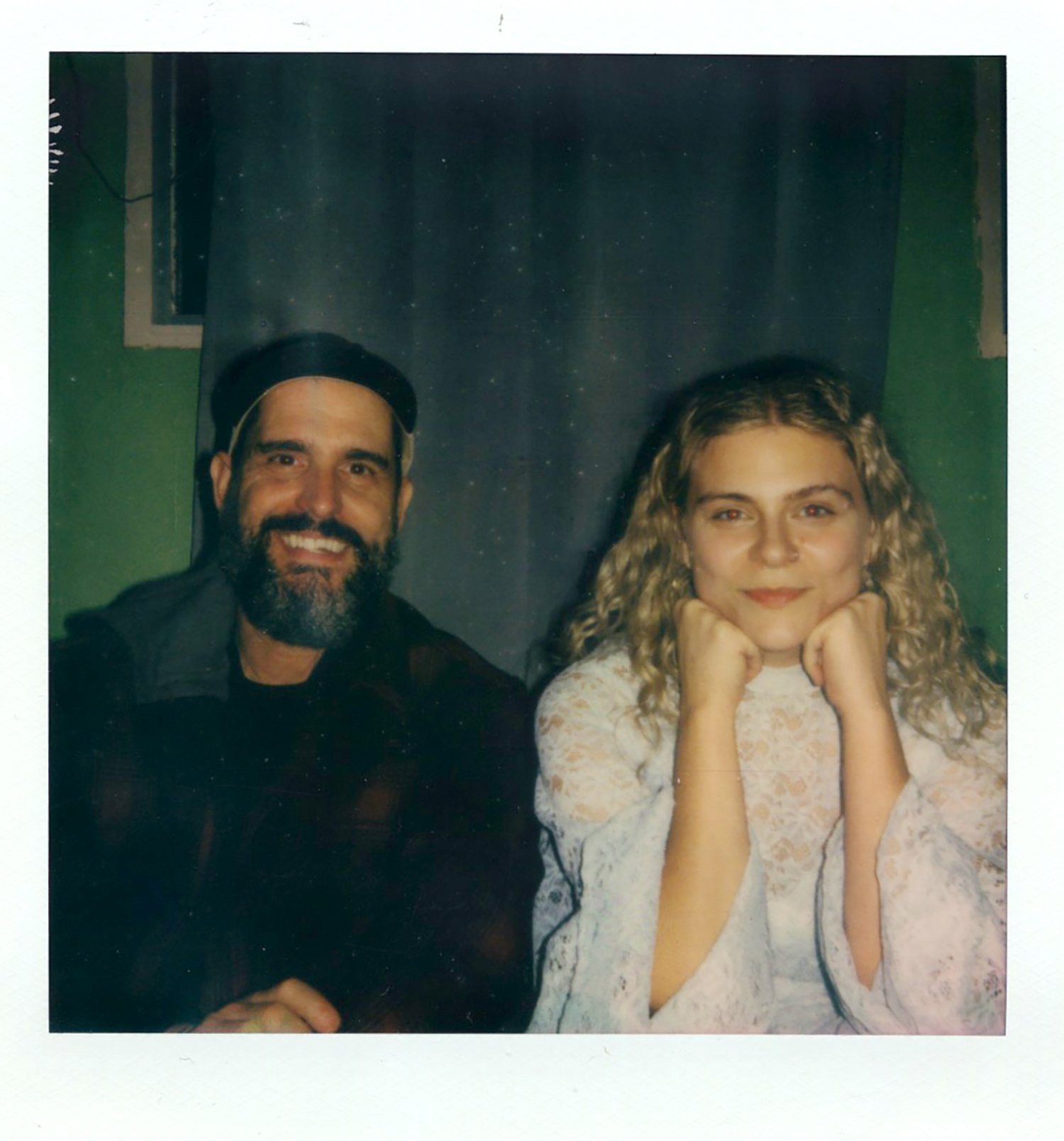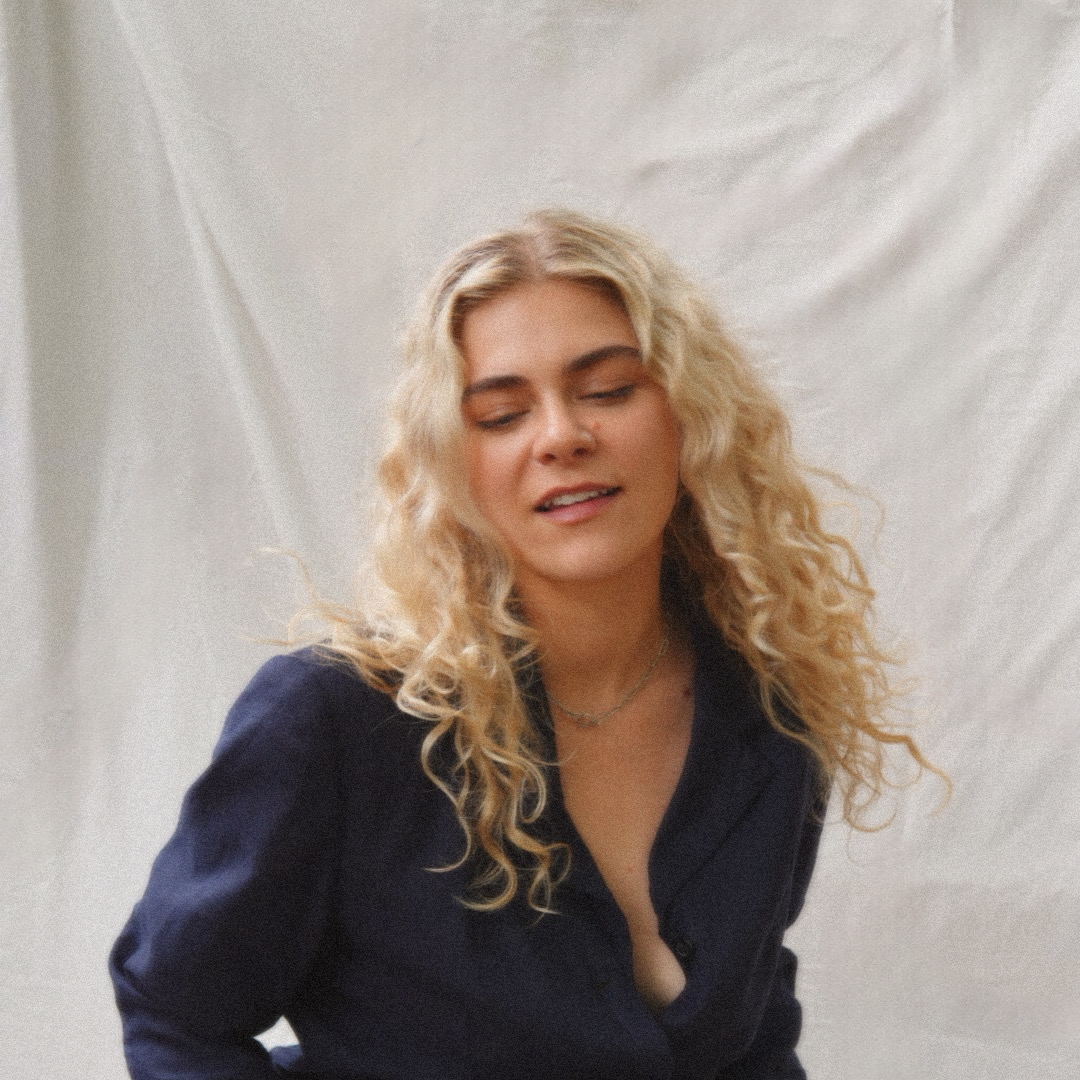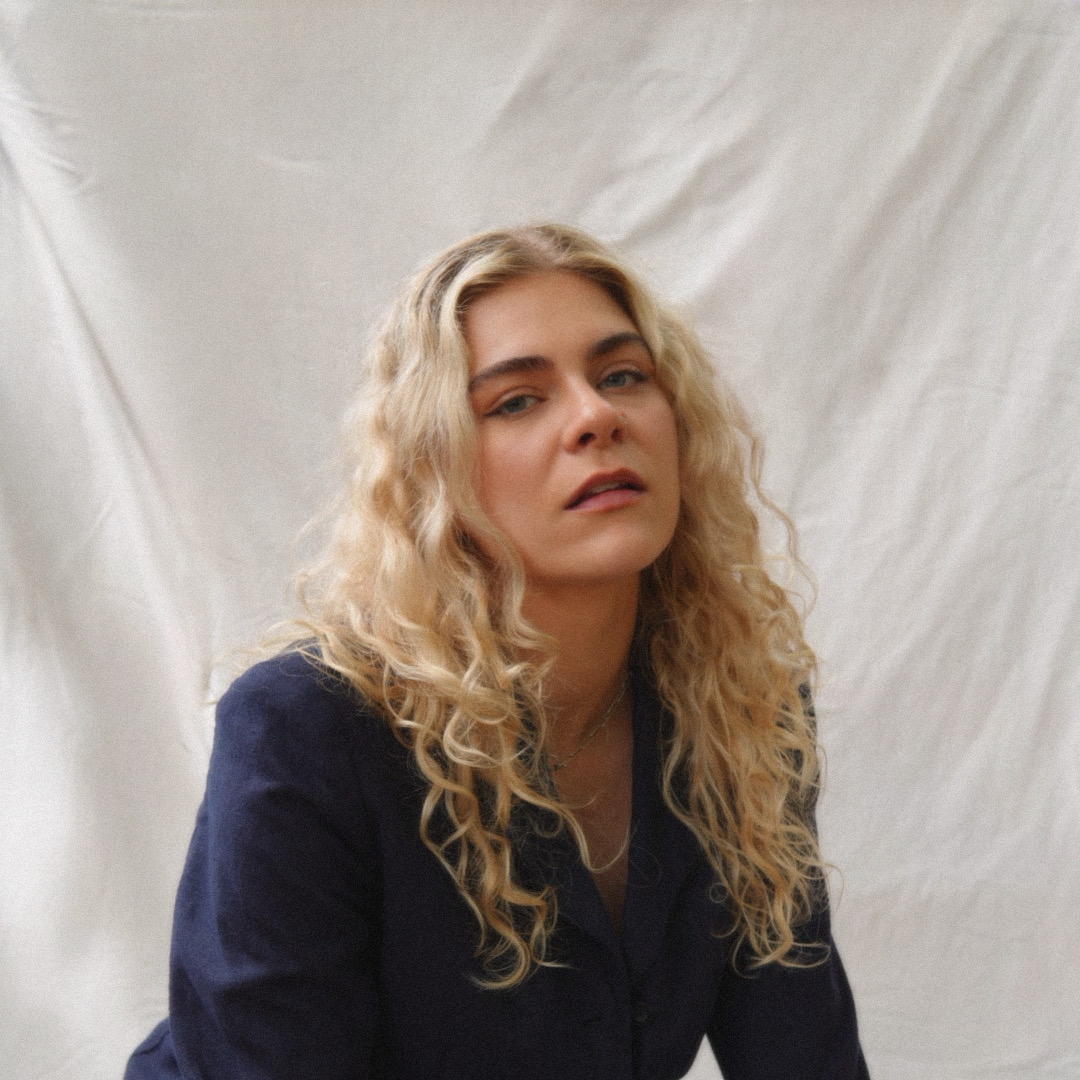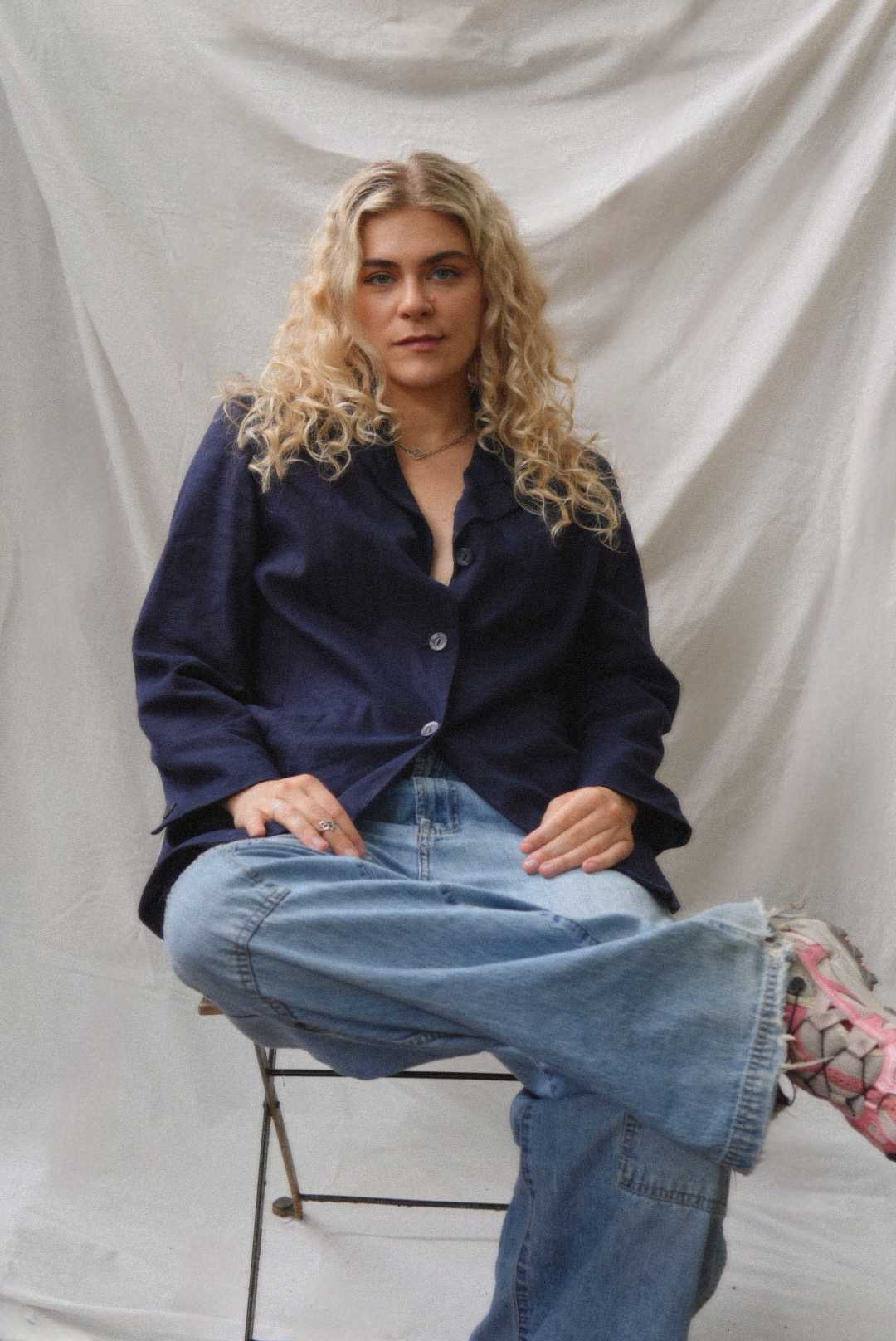Victoria Victoria’s Tori Elliott takes us track-by-track through her soothing and stirring third album ‘Sweetest Ache,’ a collaboration with Charlie Hunter that channels inner angst and existential crises into soulful, catchy, cathartic, and charming indie pop magic.
Stream: “Sweetest Ache” – Victoria Victoria
I find myself at home, knowing you’re the one that I want and I can’t let it be, the sweetest ache you’ll ever see…
Victoria Victoria’s third album opens in the depths of an existential crisis.
“My dark night of the soul has become my only friend,” Tori Elliott declares from the trenches – deep in the thick of it, channeling her fracture and fraught into a spellbinding, emotionally charged reverie. Guitars pulse passionately and drums churn an urgent beat around her radiant voice as she sings hot on the mic, wrestling with life’s biggest, most intimate questions. She ultimately resolves, “What else to say except I’m here; I’m still here.”
Answers are secondary and scant, but her power comes from the asking – from expressing that which so many of us are afraid to speak aloud. From examinations on faith and friendship to relentless ruminations on human connection and our “purpose” and “place” in the world, everything goes under the microscope and nothing is safe.
And that’s the beauty of Sweetest Ache: A cinematic record of warmth and wonder, Victoria Victoria’s third album (in collaboration with Charlie Hunter) hits hard and leaves a lasting mark as the North Carolina-based indie pop artist brings her innermost reckonings to life through soulful, catchy, cathartic, and charming pop songs.
It’s that tender kind of turbulence that stirs the heart while it soothes the soul. True to its name in every way, this LP really does hurt in the best of ways.

My dark night of the soul
Sings me gently now to sleep
It doesn’t even let me pray
The lord my soul to keep
But I’ll wake up in the morning
Ready to put on another show
And I’ll put to rest my questions
Like when we die where do we really go
I don’t know but I’m still here
And I’m scared to death to tell you
That I already know
And we’ve tried to keep this safe
Tucked inside a dome of false realities
Of plays and make belief
Everything’s okay and I don’t know
What else to say except I’m here
I’m still here
Released May 17, 2024, Sweetest Ache is an achingly intimate and enchanting triumph for Victoria Victoria and her longtime collaborator, Grammy-nominated guitarist and producer Charlie Hunter. A bold, beautiful, and at times breathtaking collection of candid snapshots delving deep into the artist’s core, Tori Elliott’s third album as Victoria Victoria sends shivers down the spine through its deft combination of rich melodies, thought-provoking lyrics, and intimate, yet expansive soundscapes. You’d never guess these songs were produced in her home studio, not that the entire record is comprised of a few people playing several (several) instruments.
No stranger to these pages – Atwood Magazine premiered her 2019 EP When to Talk, When to Pray, and named its track “Sanctuary” as one of our top songs of that year – Victoria Victoria has always had a way of enchanting our ears whilst inspiring our hearts. Her 2022 album To the Wayside represented her first collaboration with Charlie Hunter, a seasoned veteran of the industry himself – having first come to prominence in the early 1990s. Together, the pair have continued to find their shared voice as a dynamic duo of sorts, releasing a plethora of singles and the six-track Victoria Victoria and Charlie Hunter – The Live Sessions EP last August.

For Elliott, Sweetest Ache represents a return of sorts to the hooky pop music she first debuted with back in the mid-2010s.
“I had been interested in the idea of making a pop record – and I wouldn’t even necessarily put this completely in the realm of pop, genre-wise – but my last couple of projects leaned more into soul music and dipped into the jazz world just a little bit,” she tells Atwood Magazine. “I wanted to go back to pop, and I think that this was the perfect bridge between the last couple of years’ of stuff that I had been putting out, and then my venture into more poppy projects. What I wanted was something that leaned more in the pop realm. I had been binging Harry Nilsson records and The Beatles, and I think that really comes through in this record, too – maybe more than I expected it to, even – but I’m really happy with it. So I had a very loose vision, and we landed within that realm!”
“The record itself is interesting because it really draws from all [my influences],” she adds. “There’s a nod to my Emmylou Harris phase on this project, you hear the Beatles inspiration, and then also I was obsessed with Hoobastank when I was a kid, and you hear that in ‘Peanut M&M’s’… It’s really delving into all of these different eras and genres too, which I appreciate.”

The album, she says, came together quite naturally, as she and Hunter built each of her songs from the ground up.
“Most of the songs on this record I wrote within the last year, but a couple of them were ideas that I had from six, seven years ago that were just voice memos in my phone,” Tori Elliott tells Atwood Magazine. “I released this record with Charlie Hunter, who’s a guitarist and producer and has played with everybody, but we live close to each other and work together a lot. I had just played him a couple of voice memos of songs asking for help with chord progressions, and he was like, ‘Let’s just do another record,’ because we did my last record together. It was kind of a whirlwind – in just a few months, Charlie came over and he and my husband and I (my husband is a sound engineer and a mixing engineer), the three of us literally did the entire record together in my home studio, which is wild when you listen to it ’cause it sounds like a million people are on it, but it is mostly Charlie playing everything. It’s wild that it’s out now because it all happened so fast.”
Elliott candidly describes Sweetest Ache as angsty, unserious, and ‘road trip,’ explaining that she’s had the line ‘sweetest ache’ written down for several years now as an album title, and had been waiting for the right time to use it.
“The lyric wasn’t sitting right with anything that I had written, and then the song itself came to me all in one go at like 3:00 AM when I couldn’t sleep – which is the way that it goes,” Elliott recalls. “And so I had the whole voice memo recorded, and then when I got to that chorus, ‘it’s the Sweetest Ache,’ that song itself is so triumphant, but also is about the gut-wrenching feeling of being obsessed with somebody or obsessed with the idea of someone, and it’s wonderful and terrible all at the same time. That, to me, is the most universal feeling. I feel like everybody can relate to that. I knew that I wanted that song to be the title track of the album, and then it just so happened the Sweetest Ache is a great title.”

Between its vulnerable lyricism and soaring, stunning performances, Sweetest Ache truly sees Victoria Victoria shining brighter than ever.
“In the last couple of years I’ve really come into my own confidence-wise,” she says. “I think that my songwriting’s gotten a lot stronger, which is always something that I was the most proud of. This record showcases what I’ve always wanted to be, the main point of why I create and what I create and what I release, in a more refined way. I had more of a hand in this record, production-wise, than I have any other project. I co-produced it with Charlie, and I think that the confidence I felt making the record comes through in a way. Maybe the average listener wouldn’t necessarily pick up on that if they don’t know me, but I can hear the difference in my vocal performance, in my songwriting and the instrumentation and the choices that we made in the songs. There’s a confidence that comes with doing it over and over and over again.”
To that end, Elliott cites several personal highlights and memorable moments that have lasted with her.
“My favorite is ‘Empty,’ and it’s my favorite on the album as a whole because I have all of my friends singing the verses in unison with me, and the verses themselves are very… That’s one that would fall in the ‘unserious’ category, very whimsical, very wordy,” she smiles. “I remember all of my friends asking, ‘How are we supposed to learn what you need us to sing this along with you?’ And so that was really fun.”
“My other favorite song is ‘Therapist’s Armchair,’ which is a ballad that we recorded in my living room in one take, through just me and the keys. That song is heartbreak central, but also it meant a lot to me for me to release something that I wrote, that I played; there’s nothing to hide behind there. It’s just me in my living room, and that felt like a big step for me.”
Elliott says her favorite lyrics appear on the song “Lessons on Loss.”
“The refrain is, ‘White knuckle gripping onto what I have. But everything that I’ve got will turn into a lesson on loss.’ I think an alien took over my body because I didn’t even really… I was tracking the lyric and I was like, ‘Whoa! That is crazy.’ I didn’t even realize what I was saying entirely, but there are a lot of lyrics in that whole song talking about holding on so dearly to everything that we love, but that we lose it all eventually – so there’s a little sunshine for your Friday morning.”
Further highlights include the album’s love-soaked, poetic, and exposed title track (“It’s the sweetest ache, touch til my bones quake, wreckage can’t look away, like a sore that I can’t let alone, the sweetest ache I’ve ever known,” she seductively sings), the jazzy, dreamily swinging “Lessons on Loss,” and the intimate alt-folk song “Jacob’s Ladder,” in which Elliott unpacks existential angst one metaphorical rung at a time.
“I wrote ‘Jacob’s Ladder’ about spiritual deconstruction and uncertainty,” Elliott says. “It poses the question, what happens when all we know to be good begins to hurt us? How do we move beyond that, and can we ever find the good in it once again?”
“‘Jacob’s Ladder’ is all about the journey, infusing old western instrumentation and modern folk. The vocal arrangement coupled with Charlie Hunter’s acoustic and baritone guitars created a textual universe that I feel really proud of.”
I dreamt like Jacob
I was wrestling with God
In the end I won
I had a vision of myself
In robes of gold
Doing everything in my power to stay
Oh it was nice to dream again
Oh it was nice to see your face again
Oh it was good to think of you out loud
When it comes to deeper cuts, she hopes listeners pay special attention to the album’s fifth track, the spiritually questioning “Where Will We Be.”
Lord when we die where do we go
Lord when we die where do we go
I’ve heard tales of greener pastures
And golden paved brick roads
Lord when we die where do we go
When we no longer cry
Where will we be
When we no longer cry
Where will we be
Will I stand next to my mother
For all eternity
When we no longer cry
Where will we be
I love to love and I hate to hate
But sometimes I do both
The warmth of sunlight on my face
Leaves me wanting more
– “Where Will We Be,” Victoria Victoria
“That’s a song that I feel really proud of. It’s more in the folk realm, genre-wise. I wrote it in this headspace of a friend, my bandmate and one of my best friends, her grandmother had just passed away. And so she was walking through that grief. And I had a friend who had passed away, and I was attending all of these different end-of-life ceremonies because we’re both from different religions. Seeing the ways that we all deal with death and questions of, is this it? Is there something else? We’re not quite sure.”
“I grew up with a very religious Christian background, I grew up singing hymns, and I wanted to write a hymn of uncertainty and of question. And so that’s that song. We took all the vocals in one take, the three of us singing together, me and my two other bandmates. That song’s really special; as we’ve been touring, that’s been one that we’ve pulled from the new album and been performing, and every single time, it does something – for everyone collectively together, everyone playing it, everyone listening. And so that’s the one that I hope that people are drawn to on the record.”

Ultimately, Elliott hopes Sweetest Ache can be a familiar friend for listeners and a comforting companion to all those who need it;
that it can help them feel seen and heard in much the way that she did through writing these songs; and that her existential explorations can be a balm for those kept awake by the very same thoughts and unresolved emotions.
“This record has a lot of complexity to it. There are a lot of open-ended questions that are asked – and I think that for me, for my personality type and my upbringing and background, asking questions and not having answers never felt like an acceptable thing,” Elliott shares. “As I’ve been performing these songs live, the thing that I think people who are maybe in that same headspace have taken away from it is that, ‘Oh, no one actually knows anything.’ And we’re all just not knowing anything together, and there is a comfort to that.”
“I think that is what I hope that people take away from it, just that life is so full of ambiguity and complexity and nuance and doubt and fear, and that we’re all in that space together. That’s terrifying, but also kind of the beauty of the human experience. I was writing a lot of these songs in the midst of an existential crisis, like ‘what am I doing with my life,’ but also my faith upbringing, questions about all of that, questions about friendships, just everything. It was that process of examining everything with a microscope, almost to the point where it’s not helpful, but in the midst of that angst. You have some songs that live right in that space, and then other songs that live in the space of the questions themselves – where the answers don’t even really matter, it’s just the experience of asking them. I think you can hear my progression throughout that, and it feels really special.”
Experience the full record via our below stream, and peek inside Victoria Victoria’s Sweetest Ache with Atwood Magazine as Tori Elliott goes track-by-track through the music and lyrics of her third studio album!
Sweetest Ache is out now.
— —
:: stream/purchase Sweetest Ache here ::
:: connect with Victoria Victoria here ::
Stream: ‘Sweetest Ache’ – Victoria Victoria
:: Inside Sweetest Ache ::

— —
Peanut M&M’s
Reminiscent of the pop/alt punk anthems of the late ’90s and early 2000s, Peanut M&M’s sings of resilience in the midst of existentialism. The lyrics speak to the “dark night of the soul” and the confusion that comes with the deconstruction of societal, spiritual, and personal ideals. The triumphant and resistant message of the song comes to a head at the closing of the chorus with a resounding “I’m still here.”
Charlie Hunter embodies the early ’80s pop-rock of his youth with driving bass and drums and distorted electric guitars, providing a foundation for Victoria Victoria’s angsty, powerful vocal performance. “Peanut M&M’s” is both classic, and current, following the footsteps of Olivia Rodrigo’s revival of pop-punk anthems.
Lessons on Loss
“Lessons on Loss” tells of the cyclical nature of life; “Gripping onto what I have, but everything that I’ve got will turn into a lesson on loss,” sings Victoria Victoria. The lyrics of the song and its message– that ultimately, all things find their ending– contrasts the ’60s pop influences of the instrumentation and playful melodies. Charlie Hunter plays guitars, bass, drums and even vibraphones, accompanied by Victoria’s piano and vocals. This song feels both timeless and insightful, reminding us grief is guaranteed to all.
Sweetest Ache
Inspired by the soft rock arrangements of Harry Nilson, Sweetest Ache uses buoyant melodies to convey the familiar ache of limerence. The song speaks to the fantasies we create over strangers, exploring the parallel universe we live in when longing for someone we barely know. Victoria Victoria lyrically captures the self indulgence– and euphoria– of falling in love with the mirage of who one might be. Her sensual vocal performance and winding harmonies float over a bed of hammond organ and Charlie Hunter’s old-school guitar tones, creating a world as vivid as the fantasies we live in.
When You Lose
Utilizing vintage electric guitars and hammond organ, When You Lose draws influence from The Beatles and Harry Nilson, opening up at the end with a triumphant gospel feel. The song speaks of what’s loved and lost; a bitter end to a relationship with promise. Victoria sings of the mirror that is the present day, and how it illuminates the cracks that went unnoticed– the warning signs of an ultimate ending. When You Lose is the perfect moody– yet cheeky– breakup song.
Where Will We Be
Gathered in a 1920s attic, Victoria Victoria, Charlie Hunter, Noah Elliott, Ethan Gingerich and Maia Kamil recorded Where Will We Be in one take. The hymn-like quality of the song speaks to uncertainty after death, and asks the question, if all we have is love at the end, is that enough? Where Will We Be echoes the style of Natalie Bergman’s gospel/folk album, Mercy while drawing on the influences of Emmylou Harris’ Wrecking Ball and old time gospel hymns of Victoria’s youth.
Lose Me Instead
The sister track to Tear in my Eye, Lose Me Instead draws on the ’70s soul of Gamble and Huff. The song laments a relationship gone awry; the lyrics sing of losing oneself in the pursuit of loving another. “Shared custody of the blame and the guilt over this sparkly facade that we’ve built.” What happens when two people build what they think a relationship should be instead of working with what they’ve got? The very thing they tried to establish is lost.
Tear in My Eye
Tear in my Eye speaks to leaving because you have to, and not because you want to. Featuring singer-songwriter, Maia Kamil, and Victoria’s younger sister Halle Elliott, the bedrock of the tune are familial harmonies. Tear in my Eye soars, drawing inspiration from the groove of Gamble and Huff and the vocal arrangements of Aretha. The song laments the need to leave what is familiar, but knowing that growth is what waits on the other side.
Jacob’s Ladder
Jacob’s Ladder was written about spiritual deconstruction and uncertainty. It poses the question, what happens when all we know to be good begins to hurt us? How do we move beyond that, and can we ever find the good in it once again? Jacob’s Ladder is all about the journey, infusing old western instrumentation and modern folk. Victoria’s stunning vocal arrangement coupled with Charlie Hunter’s acoustic and baritone guitars create a textural universe that envelopes the listener.
Therapist’s Armchair
Recorded in a single take at her living room piano, Victoria Victoria conveys the heartache of picking up the pieces; two people, straggling along, trying their best to make it, and not quite certain they will. Therapist’s Armchair is set in a therapy session, and offers one glimmer of hope, “..we hope nobody’s leaving at the end of the day.” The felted piano and emotional vocal performance puts the listener right in the room with Victoria, feeling every note down to the core.
Empty
Empty is a boldly triumphant track, heavily inspired by the whimsy of Harry Nilson and the comradery of The Beatles. The song sings of leaving, and taunts the one being left; “You’re so empty, there without me, without my time to steal.” Utilizing a hammond organ, upright piano, vibraphone and a 1920s marching band bass drum found on the side of the road, this song is wild and celebratory, joining the ranks of Fizz’s 60s rock revival. Victoria and friends perform the vocals, leaving the listener feeling as if they were invited to the party of the year.
— —
:: stream/purchase Sweetest Ache here ::
:: connect with Victoria Victoria here ::
— — — —

Connect to Victoria Victoria on
Facebook, TikTok, Instagram
Connect to Charlie Hunter on
Facebook, Twitter, Instagram
Discover new music on Atwood Magazine
© Trent Brown
Sweetest Ache
an album by Victoria Victoria


 © Trent Brown
© Trent Brown





